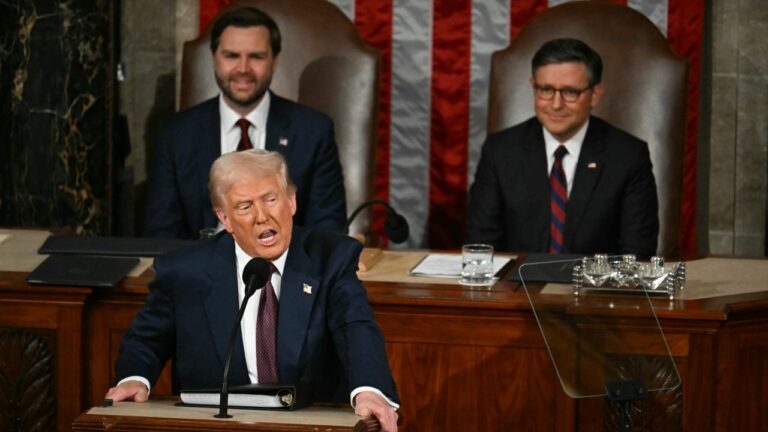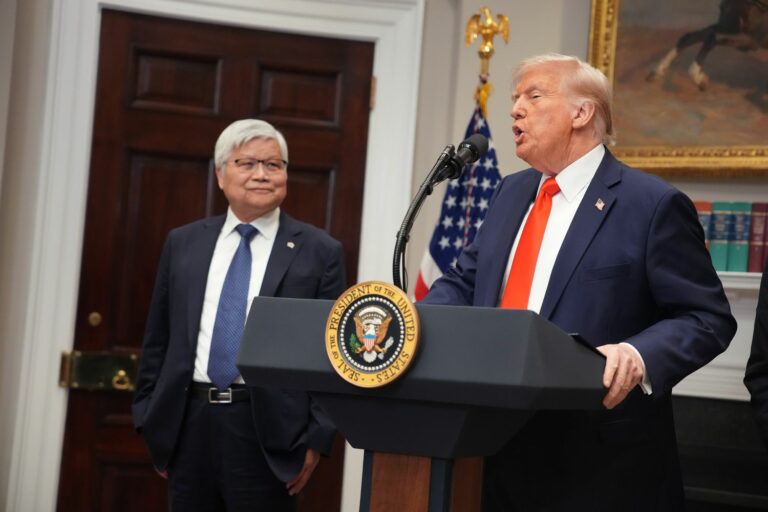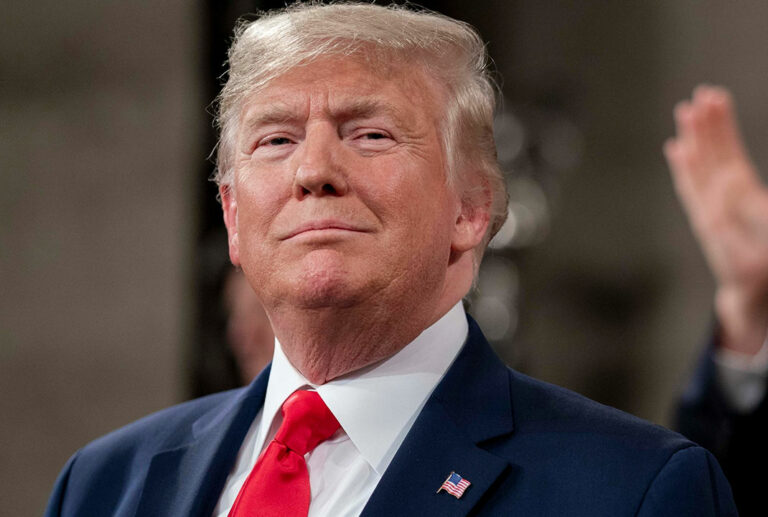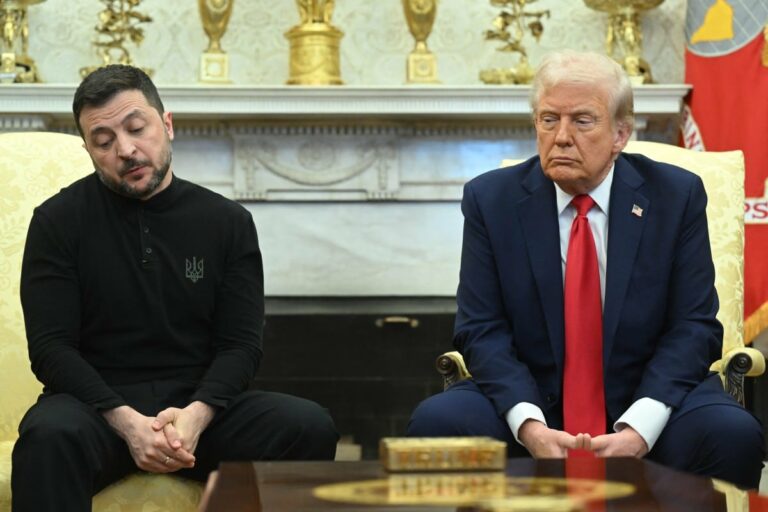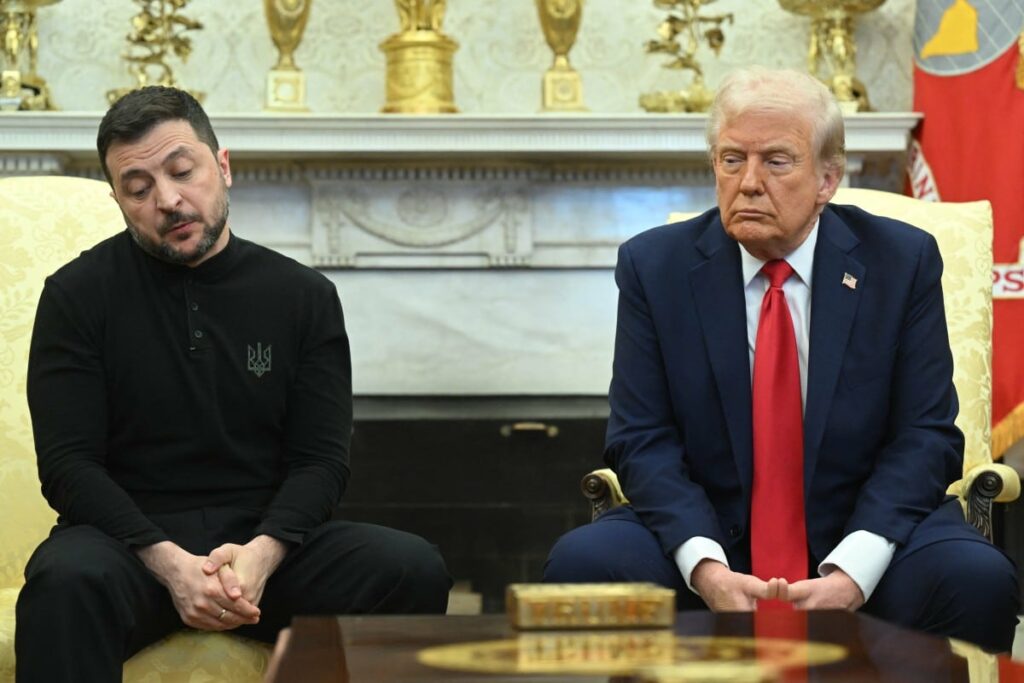
US President Donald Trump and Ukraine's President Volodymyr Zelensky meet in the Oval Office of the White House in Washington, DC, February 28, 2025. Zelensky and Trump openly clashed in the White House on February 28 at a meeting where they were due to sign a deal on sharing Ukraine's mineral riches and discuss a peace deal with Russia. "You're not acting at all thankful. It's not a nice thing," Trump said. "Its going to be very hard to do business like this," he added. (Photo by SAUL LOEB / AFP)
In a significant address delivered to Congress, President Donald Trump revealed an important development regarding the ongoing Russia-Ukraine war. In his speech, Trump tells Congress Zelensky is ready to negotiate, highlighting the Ukrainian president’s willingness to engage in talks aimed at establishing peace. This announcement not only underscores the urgency of resolving the conflict but also marks a potential shift in diplomatic strategies amid a backdrop of political tension and economic uncertainty.
The Context Behind Trump’s Address
The backdrop of Trump’s address to Congress was set by the complex dynamics of U.S. foreign policy concerning Ukraine and its conflict with Russia.
The Russia-Ukraine War’s Impact on International Relations
The war between Russia and Ukraine has had profound implications for global geopolitics.
The conflict, which began in 2014 with Russia’s annexation of Crimea, has escalated tensions between NATO member states and Russia. As countries took sides, the ramifications extended beyond military engagements, leading to economic sanctions, humanitarian crises, and shifting alliances.
The United States, under both Trump and his predecessors, has provided varying levels of support to Ukraine. This support, however, has often been contentious, reflecting broader debates about the U.S.’s role as a global leader and protector of democracy. Trump’s assertion that Zelensky is prepared to negotiate may signal an attempt to recalibrate U.S. involvement in this protracted conflict.
Analyzing Trump’s Speech
Trump’s lengthy address to Congress, lasting 100 minutes, was filled with both triumphs and challenges.
During the speech, he read directly from a letter sent by President Zelensky, who expressed eagerness for dialogue and negotiations. By publicly endorsing Zelensky’s readiness to negotiate, Trump positioned himself as a key player in diplomacy, attempting to reassure Americans of his administration’s commitment to resolving international conflicts peacefully.
The juxtaposition of Trump’s focus on negotiations with his contentious history involving Ukraine presents an intriguing narrative. Earlier breakdowns in dialogue, especially during discussions with Zelensky in the White House, reflect the complexities inherent in international negotiations, particularly those involving national pride and territorial integrity.
Public Reception and Political Ramifications
Trump’s speech elicited varied responses from lawmakers and the public alike.
As Democrats protested and walked out of the chamber, their actions underscored the deep divisions within American politics. Yet the resonant theme of negotiation from Zelensky’s letter struck a chord with many citizens. Polls indicating that a substantial majority of Americans believe Russia bears responsibility for the conflict suggest that there is a cautious optimism surrounding diplomatic efforts.
This dynamic raises questions about how negotiation tactics may shape upcoming elections and influence bipartisan approaches to foreign policy in the future.
Understanding Zelensky’s Position
Zelensky’s readiness to come to the negotiating table is a pivotal element in this ongoing narrative.
The Human Costs of War
The war has resulted in immense human suffering.
Zelensky’s willingness to engage in negotiations stems not only from strategic calculations but also from the pressing need to alleviate the humanitarian crisis facing millions of Ukrainians. The loss of life, displacement of families, and destruction of infrastructure necessitate an urgent response that transcends mere political rhetoric.
Zelensky’s statements highlight a kind of desperation shared among leaders witnessing the devastating toll of conflict. There is an understanding that continued warfare would only exacerbate existing issues while complicating prospects for peace and stability across Europe.
Strategic Alliances and International Support
Zelensky’s appeal to engage in negotiations aligns with broader geopolitical strategies that emphasize coalition-building.
By signaling openness to dialogue, Zelensky invites not only U.S. involvement but also the participation of European nations and international organizations. These partnerships are crucial in providing Ukraine with the needed resources and political backing during negotiations, enhancing the country’s leverage against Russia.
Moreover, solidifying these alliances may dissuade adversarial maneuvers from Moscow. The intricate web of relationships formed through negotiation could create pressure points that fundamentally alter Russia’s approach to the conflict.
The Minerals Deal and Economic Implications
Another interesting aspect brought up during Trump’s speech was Zelensky’s readiness to sign a minerals deal.
Ukraine possesses vast mineral resources, including critical metals that play a vital role in global supply chains. This potential agreement reflects a broader strategy to enhance Ukraine’s economic independence and fortify its position in negotiations with Russia.
The minerals deal signifies a move toward strengthening Ukraine’s economic resilience—a necessary step if lasting peace is to be achieved. By diversifying its economic partnerships and reducing dependence on any single nation, Ukraine can bolster its bargaining power and reinforce its sovereignty.
The Broader Implications of Peace Negotiations
Negotiations between Ukraine and Russia could have far-reaching consequences.
Redefining Global Power Dynamics
A successful negotiation process might redefine global power dynamics in several ways.
If Ukraine manages to secure favorable terms, it could embolden other nations facing similar conflicts. Conversely, a failure to negotiate or a perceived weakness could lead to a more aggressive stance from Russia, potentially encouraging further aggressions elsewhere.
In this sense, the stakes extend beyond Ukraine—it involves the credibility of international institutions designed to uphold peace and security. If negotiations yield results, it could restore faith in diplomatic processes at a time when skepticism abounds.
The Role of the United States in International Conflicts
Trump’s emphasis on working with Zelensky to achieve peace places the United States at the center of international diplomacy.
U.S. involvement in navigating these negotiations is critical, especially given its status as a superpower. The ability to orchestrate dialogues and facilitate agreements showcases the U.S.’s commitment to maintaining global stability. However, it also prompts discussions on accountability and ethical considerations in foreign interventions—particularly when prior military aid has sparked controversy.
To this end, the manner in which the U.S. engages with Zelensky and accommodates Russian concerns will signal to the world America’s ideological stance on interventionism versus isolationism.
Contemplating the Future of Ukraine
Speculations about what the future holds for Ukraine hinge significantly on the outcomes of these negotiations.
Should peace be attained, the rebuilding of Ukraine will necessitate substantial international collaboration. The challenge ahead will involve ensuring that post-negotiation frameworks are sustainable and conducive to long-term growth.
Moreover, Ukraine’s path towards EU integration and NATO membership remains contingent upon securing peace. A stable Ukraine may pave the way for enhanced cooperation with Western nations, fostering a sense of unity that resists external threats and promotes regional security.
